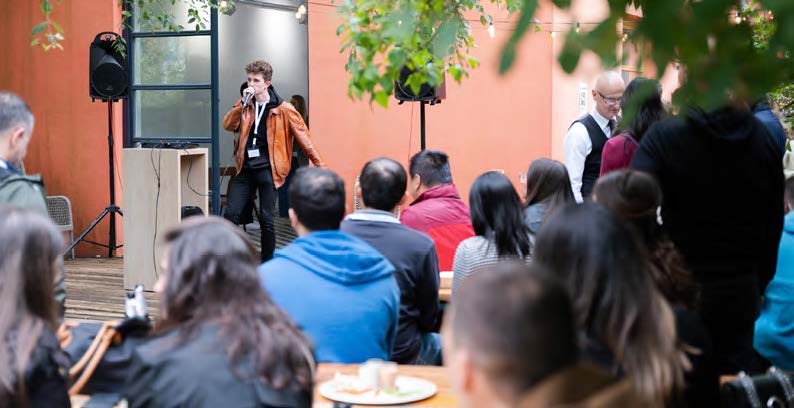News and stories 2024
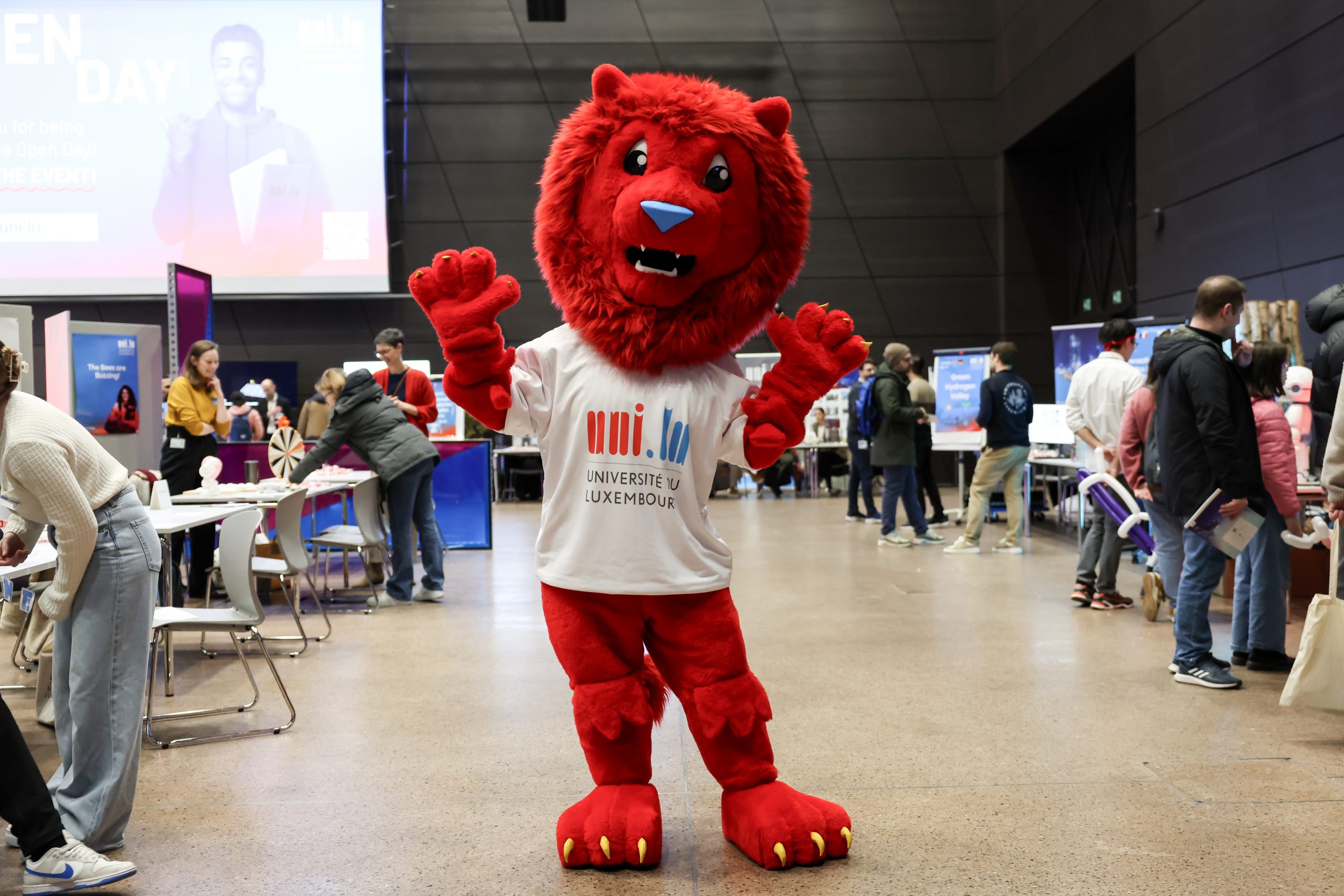
A university comes alive through its people. We talked to our staff to explore how they contribute to campus culture, student life, and fundraising efforts. On top of that, our former students told us about their lasting connections with the University that extend far beyond graduation.
Building cultural bridges
At the University of Luxembourg, Espace Cultures is much more than an organiser of events. It’s a driving force for creativity, collaboration, and critical reflection that enriches both campus life and the University’s broader mission.
“Our work goes far beyond hosting workshops or fun activities”, explains Anouk Wies, Strategic Advisor for Cultural Affairs. “We’re deeply involved in interdisciplinary projects that bring together students, staff, and researchers.”
The artist-in-residence programme brings creative professionals into the academic environment. “When creatives come to campus, they engage with researchers, professors, and students, sharing knowledge and expertise”, says Wies. “There are many parallels between researchers and artists – both are searching, questioning, and tackling significant societal issues. These exchanges inspire innovation and deepen our understanding of humanity.”
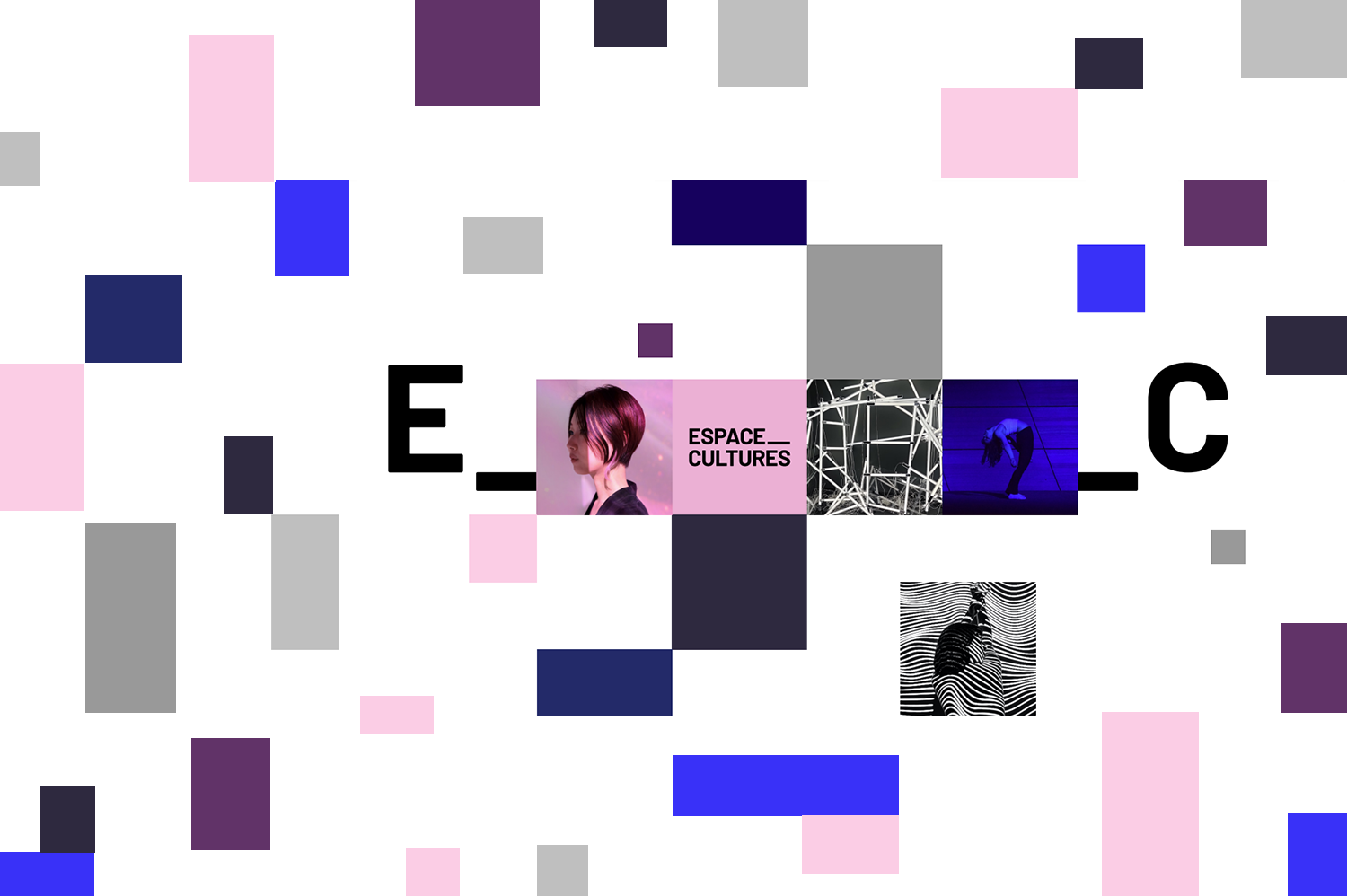
In a recent residency, Max Kreis collaborated with neuroscientists on visualising brain imaging data using AI. “The project pushed boundaries of both science and art, leaving a lasting impact on everyone involved.” Espace Cultures also connects the University with the local community. A memorable example was the Awa Odori Japanese dance workshop, a collaboration with the Japanese Embassy.
‟ We bridge the gap between the University and the world outside. Through culture, creativity, and research, we share the University’s work with a broader audience.”
Looking ahead, Espace Cultures plans to expand its interdisciplinary residencies and introduce new projects exploring sound, environment, and urban development.
Wies emphasises that cultural activities contribute to personal growth and wellbeing. “What we offer allows students to learn beyond academics. It’s about providing alternative skills, building relationships and exploring what makes us human. When students graduate, they’ll remember their student life in Luxembourg also for performing on stage, participating in a play, or connecting with others through cultural activities.”
Energising campus life
Students are the real drivers behind campus life at the University of Luxembourg. With over 30 active clubs and associations covering everything from chess to theatre, sustainability to programming, these student-led groups bring energy and community to all three campuses. These student initiatives create places where people can connect, learn, and grow new friendships.
The 2024 Student Initiative Awards further applauded these efforts by awarding innovative and successful groups, like the Student Association for Sustainability and the Writing Café, both of which are perfect examples of how students identify needs and develop creative solutions. “We started with a very specific goal: to spread sustainability on campus”, says Ulisse Bassi, whose association hosts popular SustainabiliTEA sessions where students discuss environmental issues over tea.
These student initiatives address genuine needs in practical ways: The Writing Café, for instance, creates a distraction-free environment for participants to focus on their writing. “You will find that you are in a bit of a rutor a slump”, says Desmond Bast, “and you will come into this Writing Café where they are quite strict: no phones,no tech”. Fellow participant Olga Kryvets adds that while”turning off all communications isn’t easy, the results exceed expectations, especially for women in science”who find the Café a safe and supportive space for their creativity.
The Office of Student Life offers crucial support, helping student associations and clubs gain official recognition and funding, while also organising Campus Sports and other community-building activities. This strong foundation allows student creativity to flourish. Espace Cultures contributes with fun events like “The Stage is Yours”, where students and staff showcase their talents. “We take advantage of the interculturality and diverse community to help students open themselves to other cultures”, explains Anouk Wies from Espace Cultures, though she acknowledges the challenges of bringing together different cultural perspectives.
The University’s international character with its diverse mix of nationalities and languages presents both challenges and opportunities. Student initiatives bridge these differences through shared interests, whether in the BelvalExpress theatre troupe, Uni.lu Choir, or UniJAM music sessions. Societies like the PULSE poetry club, Chess Club, and Roux Student Magazine provide creative outlets, while cultural associations help international students connect with their heritage while making new connections. As Vyara Noncheva from the Student Association for Sustainability explains, student associations and clubs create spaces “to bring students and staff from various backgrounds together” and transform this multinational campus into a connected community.
-
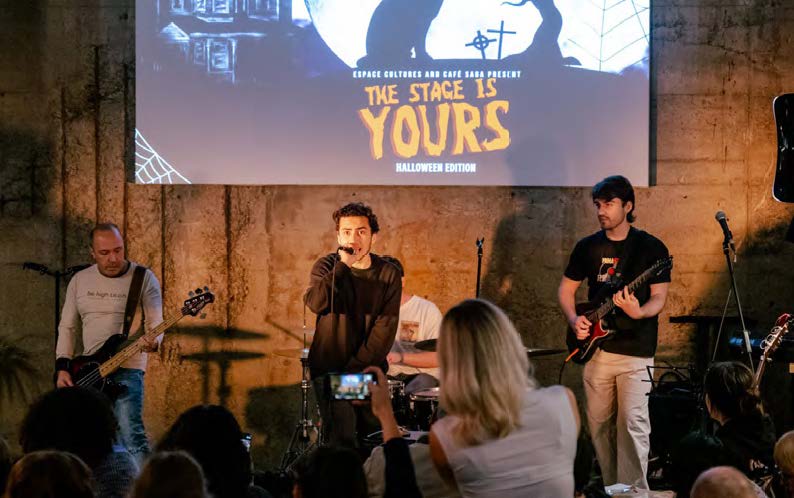
Students performing during the Halloween edition of “The Stage is Yours”.
-
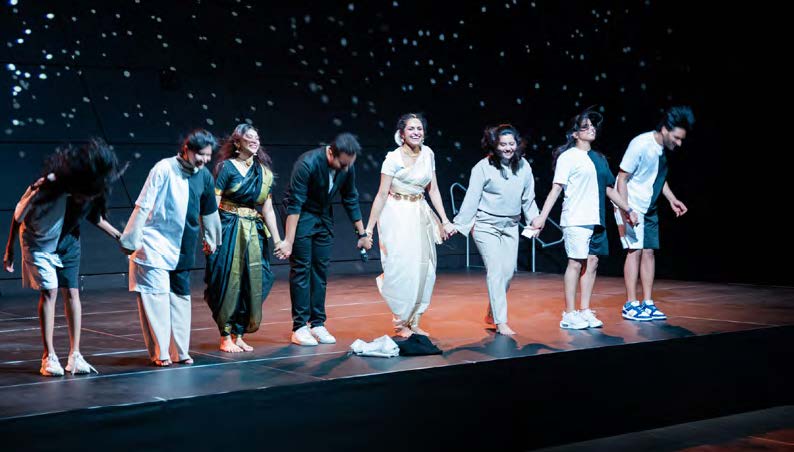
The LuxInDancers dance group on stage on Belval Campus.
Office of Student Life
The Office of Student Life enriches university life by organizing engaging activities, supporting student clubs, and connecting students with resources to create a vibrant and inclusive campus community.
Fundraising for impact – Interview with Philippe Lamesch,
Head of the Office of Fundraising
The University of Luxembourg’s main focus is on conducting cutting-edge research and attracting talented students. These two priorities are also the driving force behind the work of the Fundraising Office.
For the University of Luxembourg, how important is fundraising?
Our role is to support research excellence and student recruitment, especially as research becomes more complex and competitive. Even projects that receive excellent reviews don’t always secure funding anymore. That’s where we step in – by helping identify and engage donors who can offer alternative sources of funding.
At the same time, a university is only as strong as its student body. At the Master’s level, we are committed to attracting even more talented students, and expanding our scholarship offering is a key part of that ambition.
So that’s another area where I see a lot of value in fundraising: by developing a solid scholarship programme, we can attract excellent students who otherwise wouldn’t be able to afford to study here.
‟ By developing a solid scholarship programme, we can attract excellent students who otherwise wouldn’t be able to afford to study here.”

Can you share a story or example that illustrates this impact?
We have a broad mix of supporters: private individuals, families, large international foundations, and even people who include us in their legacies.
One example I can share involves an older gentleman who started small – donating just a few thousand euros per year to support student travel grants. These grants allowed students to attend conferences or visit research labs abroad.
Over time, we got to know him better and learned that he didn’t have children or close family. Supporting students was his way of staying connected with young people. What we didn’t know until after he passed away, was that he had set up a foundation and designated the University as the main beneficiary. It turns out the foundation is worth around 80 million euros – the largest foundation ever created by a private Luxembourgish citizen.
What’s really moving is that when the University was first created, he was a sceptic. But over time, through his personal involvement as philanthropist and his exchanges with students, his perspective shifted completely. So much so that he entrusted his entire legacy to the institution.
So what are your aspirations or goals for the coming years?
Looking ahead, I hope to see fundraising grow into a much larger and more strategic operation. Of course the University also relies on donations. They allow us to develop areas that are underfunded by public sources, especially those aligned with our research priorities.
For me, the future of fundraising is not just about raising more money. It’s about creating a strong, vibrant community of people who believe in the University’s mission and want to support it – whether through funding, advocacy, or engagement.
Alumni in the spotlight
-

Dr Jordan SAMHI
French researcher specialised
in Software Engineering and Software Security
Dr Jordan Samhi (33) was honoured with an Outstanding PhD Thesis Award of the Luxembourg National Research Fund (FNR) in 2024 and with an Excellent Thesis Award of the University in 2023. He works as a research scientist at the University’s Interdisciplinary Centre SnT.
My research focuses on mobile security. With around six billion people worldwide now using smartphones, my work has the potential to directly benefit millions, even billions, of users. For example, during my doctoral studies, I collaborated with Google to help them identify and remove malware from the Google Play Store, which allowed to safeguard millions of users from harmful applications.
The support and guidance from my supervisors greatly enhanced my learning and research quality. Additionally, interactions with colleagues and teaching activities encouraged me to explore new ideas, consider different perspectives, and think innovatively.
I appreciated being part of an institution committed to creating a positive impact in the world through research. The University of Luxembourg is not just a workplace; it’s a vibrant community of intelligent and driven people who support each other. This collaborative and inspiring environment provided me with the resources and motivation necessary to excel in my research.
Dr Begoña Talavera Andújar (28), a pharmacist from Spain, is a postdoctoral researcher in the Environmental Cheminformatics group at the University’s Interdisciplinary Centre LCSB. She was honoured with an Excellent Thesis Award of the University in 2024.
Alzheimer’s disease and Parkinson’s disease are the most common neurodegenerative diseases. Genetic factors alone typically explain less than 10 per cent of cases, which indicates that other factors, including environmental chemicals, may play an important role.My PhD focused on finding “chemical fingerprints” indifferent biological samples such as blood, for example,and environmental samples such as dust that could help us understand these complex and multifactorial diseases.This is paramount for advancing personalised medicine.
During my PhD, the interactions with different colleagues from various disciplines at the Luxembourg Centre for Systems Biomedicine (LCSB) of the University have been instrumental in advancing my research.
I love the international and multicultural environment of the University of Luxembourg. This not only facilitated my integration in Luxembourg but also enriched both my professional and personal growth.
-

Dr Nicole CITERONI
Postdoctoral researcher in International Law at Lund University in Sweden
Dr Salijona Dyrmishi (28), a computer scientist with Albanian nationality, received an Excellent Thesis Award of the University in 2024 and works as a postdoctoral researcher at the research group SerVal at the University’s Interdisciplinary Centre SnT.
My research focuses on improving the security of Artificial Intelligence (AI) by addressing adversarial attacks. This is important because AI is used everywhere now, from healthcare to finance to cybersecurity. If we can build AI systems that are more reliable and harder to fool, we make sure they can be trusted in real-world situations where mistakes can have serious consequences.
One of the biggest advantages was having close contact with my supervisor and more senior PhD students in our group. Another big learning moment was participating in the FNR JUMP programme on research/tech commercialisation funding, because it pushed me to think with more of a business mindset and explain the value of my work to people outside academia.
I loved the diversity at uni.lu, as it brought together researchers from all over the world. It was inspiring to work alongside great minds who approached problems in unique ways. Also, there are plenty of resources and funding opportunities, which help you focus on your work without constantly worrying about finances.
Dr Nicole Citeroni (32) received an Excellent Thesis Award of the University of Luxembourg in 2023 and is about to start working as an associate legal officer at the International Criminal Court.
The difficulties I encountered while writing my doctoral dissertation were the moments when I challenged myself and learned the most. I also learned a lot from the lectures I taught and the Moot courts I coached. These experiences allowed me to constructively engage with students and improve my teaching skills.
During my PhD, the interactions with different colleagues from various disciplines at the Luxembourg Centre for Systems Biomedicine (LCSB) of the University have been instrumental in advancing my research.
As a PhD researcher at Uni.lu, I absolutely loved being part of a group of young researchers coming from different countries with whom I established lasting professional and friendly relationships.
More information about…
